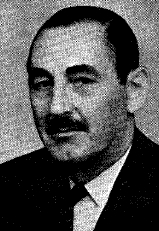Marriott Fawckner Nicholls facts for kids
Quick facts for kids
Sir
Marriott Fawckner Nicholls
CBE, FRCS
|
|
|---|---|
 |
|
| Born | 12 May 1898 London, England
|
| Died | 25 August 1969 (aged 71) Khartoum, Sudan
|
| Nationality | British |
| Education | City of London School, University of Cambridge |
| Occupation | Surgeon |
| Known for | Genito-urinary surgery |
| Relatives | Norah Schuster (1st wife); Mary Edith Harrison (2nd wife) |
Sir Marriott Fawckner Nicholls (born May 12, 1898 – died August 25, 1969) was a famous English surgeon. He was a doctor who specialized in treating problems with the body's urinary and reproductive systems. He fought in both the First and Second World Wars. For 20 years, he was the head of the medical school at St George's Hospital. Later in life, he became a surgery professor in Sudan. He was also known as "Nick" to his friends.
Contents
Early Life and Education
Marriott Fawckner Nicholls was born in London, England, on May 12, 1898. He went to the City of London School for his early education. After that, he studied at Clare College, Cambridge.
His studies were paused because of the First World War. During the war, he served as a soldier in the Royal Fusiliers. He left the army in 1919 as a captain. He finally finished his university studies in 1921.
In 1925, he married a scientist named Norah Schuster. She studied diseases. Later, in 1939, he married Mary Edith Harrison. Marriott Nicholls loved fishing and playing cricket. He even supported the cricket team at his medical school.
A Career in Surgery
Nicholls trained to be a doctor at St George's Hospital. He became a qualified doctor in 1923. In 1926, he became a Fellow of the Royal College of Surgeons of England (FRCS). This is a special title for surgeons. He earned more degrees in surgery in 1928 and 1932.
He won important scholarships for his surgical work in 1925 and 1928. He also enjoyed working as an assistant curator at the hospital's museum in 1926.
Becoming a Specialist
In 1932, Nicholls joined the team of expert doctors at St George's Hospital. He became a very successful surgeon. He specialized in genitourinary tract surgery. This means he treated problems with the kidneys, bladder, and reproductive organs.
He also worked at other hospitals, like the Atkinson Morley's Convalescent Hospital. From 1936 to 1956, he was the head, or dean, of the Medical School at St George's. He did this job while still working as a surgeon.
Moving the Hospital
One big challenge he faced was moving St George's Hospital. It moved from Hyde Park Corner to Tooting. He was the first to successfully move his surgery department to the new location. He also worked as a consultant surgeon at the Belgrave Children's Hospital and the Royal Chest Hospital. He was also a general surgeon at the Royal National Orthopaedic Hospital.
For two years, he was the chairman of the Court of Examiners at the Royal College of Surgeons. He also served on the council of the British Association of Urological Surgeons. In 1960-61, he was the president of the Urology section of the Royal Society of Medicine.
War Service
During the Second World War (1940-1946), Nicholls served in the Royal Army Medical Corps. He started as a lieutenant-colonel, leading a surgery team in Sierra Leone. Later, he became a brigadier with the Fourteenth Army in Southeast Asia. He was honored for his service in 1946.
In 1962, when he was 64, Nicholls became a professor of surgery. This was at the University of Khartoum in Sudan. He held this important position until he passed away five years later. He was given the title of "Sir" in 1969, which means he was knighted.
Death and Legacy
Sir Marriott Nicholls died in Khartoum, Sudan, on August 25, 1969. He passed away from a heart problem. His life and work were remembered in The Lancet, a famous medical journal. He is also listed in a special book called Plarr's Lives of the Fellows.
At St George's Hospital in London, a special area called the "Nicholls Ward" is named after him. This honors his important contributions to the hospital and to medicine.

